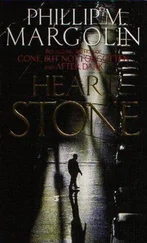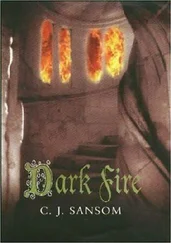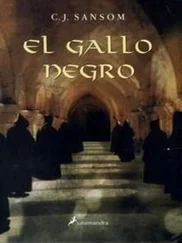Footsteps sounded outside. Peel returned with two gentlemen I had never seen, who bowed deeply to Rich. He came round the table, putting a slim arm round my shoulder. I suppressed a shudder. 'Thank you for coming, gentlemen,' he said. 'My friend Master Shardlake here wishes to put his affairs in order, given what may be about to unfold here. Would you witness his will, as a kindness to me?'
The two assented. They told me their names and watched as I signed the will and the copy, then each signed in turn as witness. Rich picked up his cap and papers from the table, together with two folded letters and his copy of the will. 'Thank you, gentlemen,' he said. 'And now, I must go, I have to attend the Privy Council.' Then he said loudly, for the witnesses to hear, 'I am glad, friend Shardlake, to have been of service regarding the girl.'
'You have done what I would expect of you, sir,' I answered evenly.
The gentlemen bowed and left. Rich still had his hand on my shoulder. He moved it and gave my hump a sharp little smack, whispering in my ear, 'I have often wanted to do that.' Then he turned to Peel, brusque and businesslike. 'Now, Colin, I want you to go with Master Shardlake into Portsmouth, find a boat, and take him out to the Mary Rose .' He placed the two letters in a leather satchel, and handed it to Peel. 'The unsealed one is my letter of authority: it will let you into Portsmouth and get you a boat. The other you are to give into the hands of the addressee, Philip West. No one else. If some ship's officer asks for it, tell them that and invoke my name. Then you are to wait with the boat till Master Shardlake returns, and get him back to shore. There will be someone else with him. Now go. Is my horse at the stables?'
'Yes, Sir Richard.'
'Sure you understand all that?' he asked mockingly.
'Yes, sir.'
'Brother Shardlake, put him right if he gets it wrong. And now, goodbye.' He bowed, turned, and walked out of the tent. Peel stared at me.
'You have the letters safe?' I asked.
'Yes, sir.'
'Then please, come. Our business is urgent.'
'YOU HAVE A HORSE, sir?' Peel asked.
'Yes. A soldier took it.'
'I'll fetch it. It will be quickest to ride to the Camber wharf.' He bowed and hurried away. I stood waiting by the tents, looking out to sea. The sun was sinking towards the horizon; it was yet another peaceful summer evening. At South Sea Castle soldiers milled round the cannon. Men were dragging another big gun across the sandy scrub of the foreshore. Some soldiers had lit small cooking fires; others were dispersing to the tents. The air was cooling rapidly as the sun lowered.
Peel returned with Oddleg and another horse. 'Can I help you mount, sir?' he asked politely.
I looked at him curiously, remembering how he had taken Rich's insults in his stride. 'Thank you. You must have seen much of the preparations for this invasion, fellow, working for Sir Richard.'
His face became guarded. 'I don't listen, sir. I'm just a servant, I do my little jobs and keep my ears closed.'
I nodded. 'That's a safe way to live.'
We rode away to the town, skirting the Great Morass. 'Well,' I asked, 'what do you think of all this?'
'I pray my master gets away if the French do land. But he is a clever man.'
'That he certainly is.'
There were no fowl on the still waters of the Morass; the guns must have scared them away. We approached the town walls, where the labourers working on the fortifications were packing up their equipment.
'Were you with your master in Portsmouth today?' I asked Peel.
'No, sir. I stayed in camp. We all ran out of the tents when they shouted the French ships were coming. Then the King rode in from Portsmouth.'
We came round the town walls to the main gate. Peel showed the guard Rich's letter of authority and we were allowed in at once.
The High Street was deserted now apart from patrolling guards, the windows of the houses and shops all closed and shuttered; I wondered whether the owners had all left. Inside one a dog howled. A solitary cart laden with freshly slaughtered sides of beef lumbered past, dripping blood onto the dust.
Oyster Street, by contrast, was as crowded as ever, soldiers and sailors jostling with labourers. Now the French had gone more supplies were being loaded onto boats at the wharf. We halted by the warehouses. Across the Camber there were now soldiers on guard even on the empty spit beyond the Round Tower. The English warships stood at anchor out in the Solent.
'Will we be able to get a boat?' I asked Peel worriedly.
'We should with my letter, sir. Wait here a minute, if you please. I'll get the horses stabled.'
'You have the other letter? For Master West?'
He patted his satchel. 'Safe in here. I am not a fool, sir,' he added in a hurt tone.
'Of course not.' I looked across at the ships. 'But please, be quick.'
We dismounted and Peel led the horses away. I saw the huge bulk of the Great Harry . There must have been a great panic on board when they saw the French coming. My eye found the Mary Rose , where Emma was with Leacon's company. A company of soldiers marched down Oyster Street. They must have come straight in from the country, for they kept staring out to sea, eyes wide.
I heard a shout from below me. Looking down, I saw Peel standing with a boatman in a tiny rowboat at the bottom of some steps. 'Hurry, sir,' he called urgently. 'Before someone requisitions it.'
* * *
THE BOATMAN, a young fellow, rowed quickly out, past heavily laden supply boats. I had a view of the French ships in the distance, the setting sun casting a red glow on a close-packed forest of masts. A sudden volley of gunfire sounded from them, booming across the still water. Peel sat up, eyes wide.
'They're trying to make us jumpy,' the boatman said. 'Bastard French serfs. They're too far off to hit anything.' He turned the boat and headed for the line of warships. Some of the smaller ones had retreated to the harbour, but forty or so rode in a double row, two hundred yards apart, turning slowly on their anchors as the tide ebbed. We rowed out to the Mary Rose . It had been night when I boarded her before, but now, in the fading daylight, I could see how beautiful she was, as well as how massive: the powerful body of the hull, the soaring masts almost delicate by contrast; the complex web of rigging where sailors were clambering; the castles painted with stripes and bars and shields in a dozen bright colours. The gun ports were closed, the ropes by which they were opened from the deck above hanging slack. A boat was already drawn up at the side, and what looked like boxes of arrows were being hauled up through gaps in the blinds to the weatherdeck.
'I'll row round to the other side,' the boatman said. He pulled past the bow and the immense ropes of the twin anchors, then under the tall foremast with the red and white Tudor Rose emblem at its base. There were no supply boats on the other side. We pulled in. Again someone on the tops shouted, 'Boat ahoy!' and a face appeared on deck, looking down through an open blind.
Peel shouted up, 'Letter from Sir Richard Rich for Assistant-Purser West!' A few moments later a rope ladder came down, splashing as the end hit the water. Peel and I stood up carefully as the boatman grabbed the end. Peel looked at it anxiously.
'Climb up behind me,' I told him. 'It's not that bad, just keep a firm hold and don't mind the swaying.' I turned to the boatman. 'You may have to wait a little.'
'Yes, sir.' He stood too, flexing stiff arms.
I began climbing the ladder, Peel behind me.
* * *
AGAIN I WAS helped through a gap in the blinds by a sailor. This time I was able to descend to the planks of the weatherdeck with a little more dignity. Peel followed, looking shaken. There was an immense bustle on the deck, which was full of soldiers as well as sailors. A young officer with a whistle on a purple sash was waiting for us. 'You have a message from Sir Richard Rich for Master West?' he asked abruptly. Peel took the letter from his satchel and held it up for the officer to see the seal.
Читать дальше












